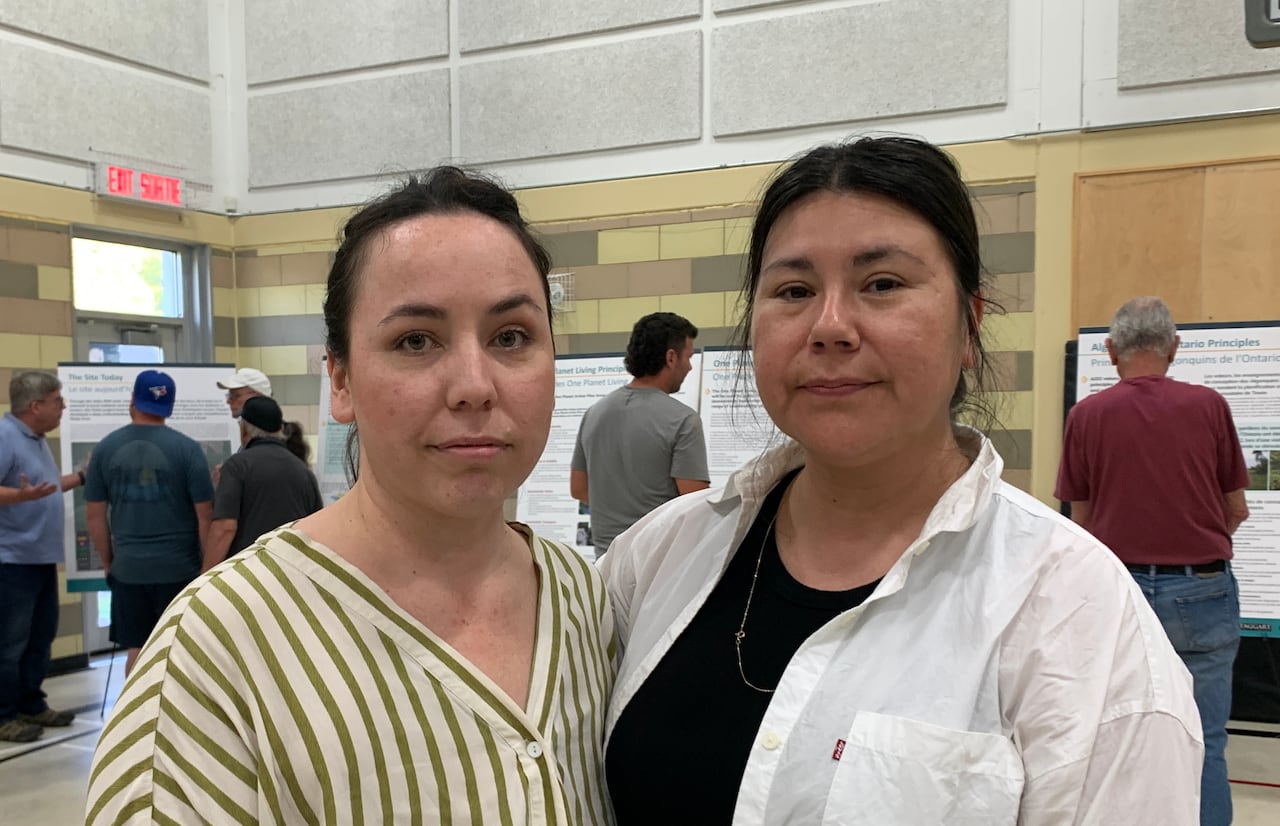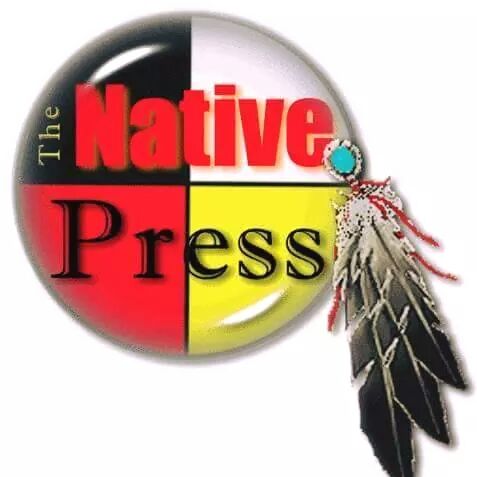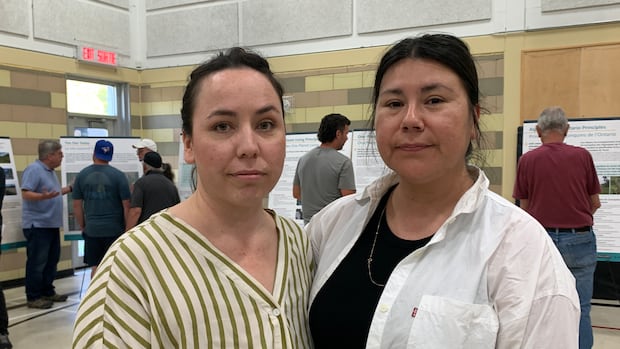[ad_1]
The Algonquin Anishinabeg Nation Tribal Council is seriously considering launching a legal challenge against the City of Ottawa, arguing the municipality is failing in its duty to consult First Nations under the constitution — especially when it comes to the massive future development known as Tewin.
That risk is one of many laid out in a motion by Coun. Theresa Kavanagh that goes to the city’s planning and housing committee for debate on Oct. 15.
Kavanagh is pushing colleagues to delete 445 developable hectares in Ottawa’s rural south-east from the official plan, effectively reversing a controversial decision made four years ago by the previous city council under former mayor Jim Watson.
Grand Chief Savanna McGregor, who represents seven of the nine federally recognized First Nations located in Quebec, has opposed the development project between the Algonquins of Ontario (AOO) and developer Taggart Group since council first debated it in 2021.
For her, Tewin is part of a much larger fight about who should legitimately negotiate, and be consulted about, unceded Algonquin territory in the National Capital Region and beyond.
The AOO was formed 20 years ago to negotiate a modern-day treaty, and includes 10 communities in Ontario. Only the First Nation of Pikwakanagan on Golden Lake west of Ottawa is a federally recognized band. In recent years, nearly a quarter of its members have been stripped from its voter list because they didn’t have Algonquin ancestry.
First Nations located in Quebec are not part of the AOO, and many see it as an illegitimate organization.
If you don’t fight for your rights, you lose them. And that is no gift that any leader wants to give to future generations.– Savanna McGregor, grand chief of the Algonquin Anishinabeg Nation Tribal Council
McGregor sees the Tewin project as a slippery slope, because the AOO has embarked on several projects and is routinely consulted by governments at all levels.
“If we don’t fix this, or if it doesn’t get rectified, then what kind of predicaments could we face in the future?” she asked.
“To recognize people who are not us, and then to move forward with consultations and major projects, it’s kind of like a spiritual, ideological war.”
Contentious 2021 decision
In January 2021, city councillors considered a surprise last-minute motion to expand Ottawa’s urban boundary to include rural land that the Algonquins of Ontario Realty Corp. had purchased from the Ontario government.
City staff had not studied that land for future urban areas because it was far from existing infrastructure, thought to have poor soil, and had wetlands that were unevaluated at the time.
The original argument by members of council to greenlight Tewin was that it would be an act of reconciliation.
Algonquin chiefs of First Nations in Quebec immediately denounced that argument and wrote letters demanding to be properly consulted, but said months later there had been no meetings.
In the years since, there have been multiple studies and consultations to plan Tewin, and the community’s design is reaching its final phases. There remain questions about the cost of future infrastructure, which could be in the hundreds of millions for water service alone.

Many council members say the city has come too far, and voting next week to unravel Tewin would prove costly on many fronts.
“I think members of the public don’t want us to go back and relitigate all the previous decisions from previous terms of council,” said Mayor Mark Sutcliffe, who was elected in 2022. “If we were to stop Tewin from proceeding, the Ontario Land Tribunal might overturn that decision and we’d be stuck with Tewin again.”
Rights under the Constitution
But the city’s involvement with the Algonquins of Ontario on Tewin still angers the tribal council.
“How can you reconcile the Anishinābe Algonquin Nation as a whole when you’re doing business with people who are not us?” asked McGregor.
The tribal council has been working with Amir Attaran, a lawyer and University of Ottawa law professor, who has been seconded to it by the university.
Attaran says the Algonquins of Ontario are merely an unincorporated organization with no aboriginal rights under s. 35 of Constitution Act, 1982, the way First Nations do.
The executive director of the Algonquins of Ontario disagrees.
“They’re entitled to their opinion,” said Jim Meness of the tribal council. He said if the AOO didn’t have s. 35 rights, the federal and provincial governments wouldn’t be negotiating a land claim with the group.
City’s role
Attaran says there’s no question the First Nations in Quebec have rights under the Constitution, and in Ontario’s planning policy, but the City of Ottawa has failed to do meaningful consultation with Algonquin First Nations and to accommodate them.
The Ontario-Quebec border makes no difference, Attaran adds, because the Algonquins’ claim to the land predates Canada and the creation of provinces.
“What really stands out to me is the city’s absolute legal illiteracy when it comes to what the constitution requires in dealing with Indigenous peoples,” said Attaran. “Honestly, the city needs remedial education on the law. It’s that backward.”
Royce Fu, the city’s manager of policy planning, said staff were unable to comment before the motion comes before the committee on Wednesday.
City staff have previously listed the ways in which it had engaged with Indigenous communities on its official plan, starting in January 2020.
In a response to an inquiry in April, staff said the city had communicated with various groups, including the tribal council and Kitigan Zibi Anshinabeg First Nation.
They also listed a committee on Jan. 25, 2021, which heard from the former Algonquins of Ontario negotiation representative for Ottawa. Indeed, the late Lynn Clouthier had made many of the initial pitches to councillors to include Tewin in the urban boundary.
She later resigned from the AOO. Her name was taken off the list of voting members because her family line did not have an Algonquin connection, Meness confirmed to CBC News.
Debate next Wednesday
Attaran says the planning and housing committee can decide to support Kavanagh’s motion and abandon Tewin next Wednesday. If it chooses to go ahead, he says, the city could simply face these arguments later.
“They could go on throwing money and effort at this. They could be 90 per cent of the way to the finish line and they could still be legally blocked,” Attaran said.
McGregor acknowledges that many on Ottawa city council might feel it’s too late to turn back, but says she and other Algonquin leaders will continue to fight to protect their unceded territory. She will be consulting with the tribal council’s leaders before deciding how to proceed.
“If you don’t fight for your rights, you lose them,” McGregor said. “And that is no gift that any leader wants to give to future generations.”
[ad_2]
Source link

